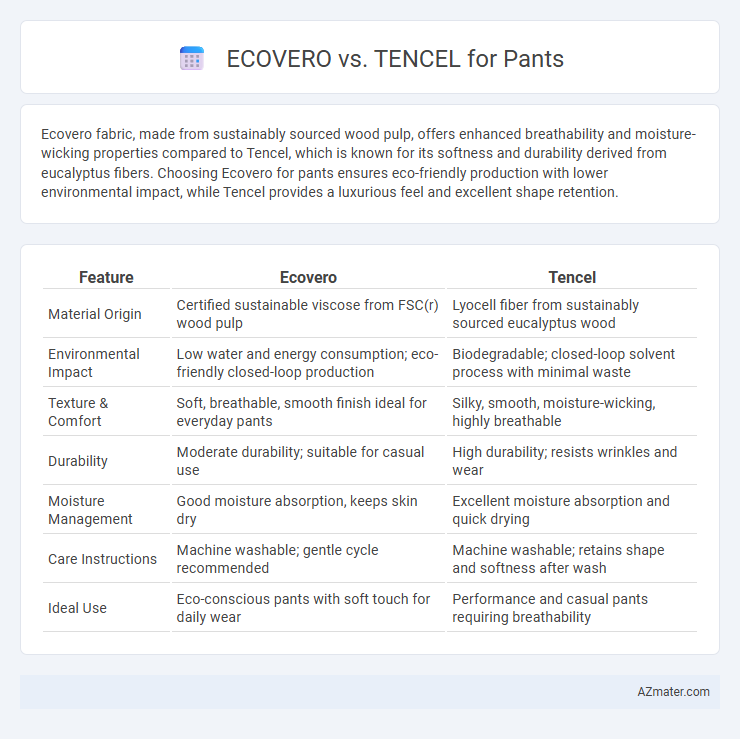Ecovero fabric, made from sustainably sourced wood pulp, offers enhanced breathability and moisture-wicking properties compared to Tencel, which is known for its softness and durability derived from eucalyptus fibers. Choosing Ecovero for pants ensures eco-friendly production with lower environmental impact, while Tencel provides a luxurious feel and excellent shape retention.
Table of Comparison
| Feature | Ecovero | Tencel |
|---|---|---|
| Material Origin | Certified sustainable viscose from FSC(r) wood pulp | Lyocell fiber from sustainably sourced eucalyptus wood |
| Environmental Impact | Low water and energy consumption; eco-friendly closed-loop production | Biodegradable; closed-loop solvent process with minimal waste |
| Texture & Comfort | Soft, breathable, smooth finish ideal for everyday pants | Silky, smooth, moisture-wicking, highly breathable |
| Durability | Moderate durability; suitable for casual use | High durability; resists wrinkles and wear |
| Moisture Management | Good moisture absorption, keeps skin dry | Excellent moisture absorption and quick drying |
| Care Instructions | Machine washable; gentle cycle recommended | Machine washable; retains shape and softness after wash |
| Ideal Use | Eco-conscious pants with soft touch for daily wear | Performance and casual pants requiring breathability |
Introduction to Eco-Friendly Fabrics for Pants
Ecovero and Tencel are innovative eco-friendly fabrics derived from sustainably sourced wood pulp, ideal for pants due to their softness and breathability. Ecovero, produced through a certified sustainable process, offers reduced environmental impact with lower water and emissions compared to conventional viscose. Tencel, known for its closed-loop production, provides excellent moisture management and durability, making both fabrics popular choices for sustainable fashion pants.
What is Ecovero?
Ecovero is a sustainable viscose fiber produced from certified renewable wood sources using an eco-responsible production process that reduces environmental impact by up to 50% compared to conventional viscose. It offers softness, breathability, and moisture management, making it an ideal fabric for comfortable and eco-friendly pants. Its certification by the European Union Ecolabel ensures high standards of sustainability and low emissions throughout the manufacturing cycle.
What is Tencel?
Tencel is a brand name for lyocell fibers produced by Lenzing, known for their eco-friendly manufacturing process using sustainably sourced wood pulp. It offers exceptional softness, breathability, and moisture-wicking properties, making Tencel ideal for comfortable, durable pants. Compared to Ecovero, which is a sustainable viscose fiber mainly used in lightweight fabrics, Tencel typically provides higher strength and better performance in activewear and tailored pants.
Environmental Impact: Ecovero vs Tencel
Ecovero and Tencel both offer sustainable alternatives for pants production, with Ecovero being derived from certified sustainable wood pulp and featuring a 50% lower environmental impact compared to conventional viscose. Tencel Lyocell, produced using an eco-friendly closed-loop process, recycles more than 99% of its solvents, significantly reducing water and energy usage. When comparing environmental impact, Ecovero excels in reducing emissions and water consumption, while Tencel's regenerative sourcing and biodegradability provide strong eco-friendly credentials for sustainable pants manufacturing.
Comfort and Feel: Comparing Ecovero vs Tencel
Ecovero and Tencel both offer exceptional comfort and a soft feel, making them popular choices for pants fabric. Ecovero, derived from sustainably sourced wood pulp, provides a smooth, breathable texture that is gentle on the skin and helps regulate body temperature. Tencel, a brand of lyocell fibers from sustainably managed eucalyptus trees, is known for its silky softness, moisture-wicking properties, and durable yet lightweight feel, enhancing all-day comfort in pants.
Durability and Longevity of Pants
Ecovero and Tencel fibers both offer sustainable fabric options for pants, but Tencel typically outperforms Ecovero in durability and longevity due to its stronger fiber structure and resistance to wear and tear. Tencel pants maintain shape and color retention through multiple washes, making them a preferred choice for long-lasting apparel. In contrast, Ecovero, while eco-friendly with good breathability, tends to have a shorter lifespan and can show signs of pilling and fading more quickly.
Breathability and Moisture Management
Ecovero and Tencel both offer excellent breathability and moisture management for pants, with Ecovero made from sustainably sourced wood pulp providing enhanced airflow and quick-drying properties. Tencel fibers, derived from eucalyptus trees, excel at wicking moisture away from the skin to keep wearers dry and comfortable during prolonged use. The antimicrobial properties of Tencel further enhance its performance in moisture management compared to Ecovero, making it ideal for activewear and everyday comfort.
Style and Versatility for Pants Designs
Ecovero and Tencel both offer sustainable fabric options for pants, each excelling in style and versatility. Ecovero, derived from certified sustainable wood pulp, provides a soft texture with excellent drape, ideal for tailored or flowy pants designs emphasizing comfort and elegance. Tencel, known for its moisture-wicking properties and durability, suits a wide range of styles from casual to formal, offering flexibility in patterns and cuts while maintaining breathability and a smooth finish.
Maintenance and Care Requirements
Ecovero pants require gentle washing with mild detergents to maintain fabric quality and vibrant color, avoiding high heat during drying to prevent shrinkage. Tencel pants benefit from low-temperature washing and air drying to preserve fiber strength and softness, as excessive heat can damage the cellulose fibers. Both materials demand careful handling to extend garment lifespan, with Ecovero emphasizing eco-friendly care products and Tencel relying on moisture retention for wrinkle resistance.
Which Is Better for Pants: Ecovero or Tencel?
Ecovero and Tencel are both sustainable fabrics made from wood pulp, but Tencel, specifically lyocell, is often better for pants due to its superior strength, moisture-wicking properties, and softness, providing enhanced durability and comfort for everyday wear. Ecovero is more eco-friendly with a lower environmental impact during production but sometimes lacks the same performance qualities as Tencel in terms of breathability and wrinkle resistance. For pants that require a balance of sustainability and long-lasting wearability, Tencel remains the preferred choice.

Infographic: Ecovero vs Tencel for Pants
 azmater.com
azmater.com